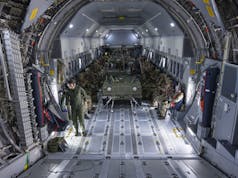The NATO Chief Scientist, Dr Bryan Wells, has just launched the ‘NATO Chief Scientist Challenge’, calling for solutions in virus detection, improved situational awareness, decontamination, resilience and the post-COVID-19 future.
The Challenge was reportedly sent out to over 6000 scientists in NATO’s network.
“Proposals, from research articles to prototypes, are expected by the end of April. Working with NATO Allies, partners and staff, the Office of the Chief Scientist will help turn the best proposals into reality.
Finally, NATO say it is using the capabilities of its own laboratory, the Centre for Maritime Research and Experimentation in La Spezia, which conducts new research in big data analytics, modelling and simulation for decision-making.












Just saw on flightglobal, the ACA (Aviation Clean Air) cabin purifier. If I have read it right, it uses bipolar ionization to kill airborne viruses. It is certified on business jets for billionaires. Is said to be suitable for passenger planes. Might be a way to bring airlines back before they go bust. Perhaps suitable for RAF Voyager as long as AirTanker is not greedy on mark up.
I thought the majority of the risk was from contact? Maybe just Ryan Air but the aircon was never up to much, so hard to see it doing much in way of sucking up bugs.
Well, I don’t think there will be a single magic bullet. It will take a variety of things, to get back to (near) normal.
Sadly possibly not re contact/airborne. There’s research out now (been around for a few weeks) that suggests that as well as the big droplets, the ones that many of us have probably seen in those yucky slo-mo videos of test subjects coughing, some researchers also claim to have observed much smaller microscopic aerosol droplets that can linger in the air possibly with active virus for some time – up to 3 hours is a number I’ve seen quoted a few times but I’ve also seen 6 hours mentioned. I don’t know how widely such research has been peer reviewed and any associated experiments reproduced by other researchers but if true it would help explain why Covid-19 has been so contagious.
If semi-persistent airborne particles able to carry active virus for more than a few seconds are real then better cabin filtration would help but might not remove anything like all of the risk. I would want to know exactly where all of the inlets for the aircon were positioned in all cabin configurations. If every seat has an inlet with reasonably good suction drawing air straight up then that is probably OK because everyone’s exhalations probably go straight up (although linger time would also depend on extraction rate) but if there are fewer inlets, maybe 4 or 8 in each cabin as a randomly thought up less favourable possibility, then contaminated air breathed out by one infected passenger is almost certainly getting drawn past a good number of other passengers before it gets to its nearest aircon inlet vent.
Perfect may be the enemy of good enough. Perfect may stop the planes flying long enough for the airlines & the airports to go bust. This ACA mechanism of ionization for inactivating airborne virus has been independently tested as being effective against TB, C. difficille, Noro Virus, MRSA, Staph, mold spores, E coli, Legionella.
There was a fuss a few years ago, when a third world economy passenger managed to infect the cabin with TB, including high powered American execs in business class.
If passenger temp is taken at the entrance to the airport, then obvious C-19 can be stopped at the door. If every passenger is given a squirt of hand sanitiser as they board. Then a cabin filter using bipolar ionization, may not protect the person sitting next to someone with C-19, but it should protect the rest of the cabin. It is going to be a layered solution to getting civil aviation going again.
“Perfect may be the enemy of good enough. Perfect may stop the planes flying long enough for the airlines & the airports to go bust.”
That’s an extremely good point, and one that will probably need to be applied to many areas when considering how to craft whatever our “new normal” becomes. Consider my outlook duly adjusted. Thanks!